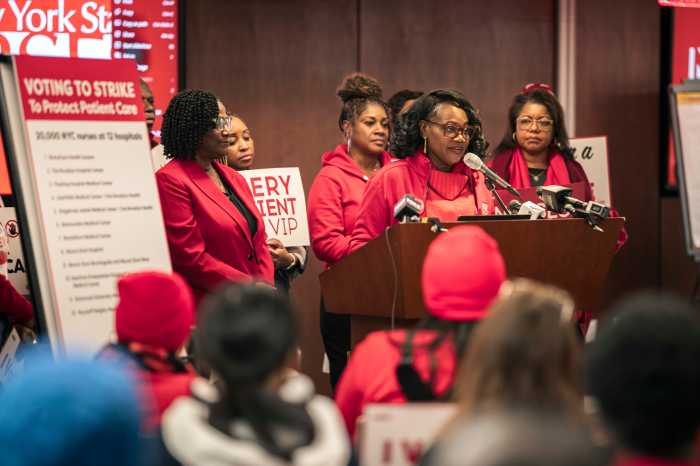The city’s Health Department is warning New Yorkers about the rising spread of a potentially serious illness linked to rats.
Just as the City Council announced a proposal for controlling the city’s rat population using birth control, the city’s Health Department released an advisory saying that cases of human leptospirosis – an infection associated with exposure to environments and materials contaminated with rat urine – continue to rise in the city.
There were 24 cases of leptospirosis in 2023, the highest number in a single year, according to the NYC Department of Health and Mental Hygiene. As of April 10, there have already been six confirmed cases in New York City this year.
Leptospirosis can cause acute kidney and liver failure, and occasionally severe pulmonary involvement, according to the Health Department.
According to the Centers for Disease Control and Prevention, leptospirosis in humans can cause high fever, headache, chills, muscle aches, vomiting, diarrhea, jaundice, red eyes, abdominal pain and rash.
There have been 98 local cases of the infection from 2001 to 2023. Six of those patients died.
The health advisory says cases must be reported to the NYC Health Department within 24 hours. More information is available on the website.
Avoid contact with rats

The best way to prevent leptospirosis, according to the Health Department, is to avoid contact with rats.
While avoiding rats is hard to do in the Big Apple, the City Council recently proposed a solution that would control the rat population through birth control.
The proposal, called Intro 0736-2024, is part of a series of bills aimed at protecting birds of prey who often die from eating rats that ingested poison. Other bills in the package have additional protective measures for birds of prey, and collectively they are called “Flaco’s Law.”
Flaco, NYC’s famous Eurasian eagle-owl who died when he flew into a building on the Upper West Side in February, was the inspiration for the bills. When scientists from the Bronx Zoo necropsied Flaco, they found high levels of rat poison in his system that would have eventually killed him.
Sponsored by Council Member Shaun Abreu (D-Manhattan), the birth control bill would require the Health Department, in consultation with the Department of Sanitation, to establish a pilot program to deploy rat contraceptives in the form of edible pellets. The program would first take place in a containerized zone, pending bill passage.
Can rat birth control actually work?
According to a spokesperson for Abreu, the council member “worked closely” with Loretta Mayer, a scientist who invented rat birth control and has a nonprofit, WISDOM Good Works that is dedicated to nontoxic, humane solutions to rodent control.
There are plenty of benefits for using rat birth control, according to Abreu, animal rights activists and conservationists. These benefits include humane pest control and conserving urban wildlife.
Dustin Partridge, Ph.D., is the director of conservation and science at NYC Audubon. He explained that using poison to kill rodents has a devastating impact on birds of prey.
“When birds of prey such as owls eat rodents that have ingested rodenticides, they become poisoned themselves,” Partridge said. “Low levels of rodenticide may alter behavior, putting birds at risk, and if an adult or chick has eaten too much poisoned prey, the rodenticide can be directly lethal.”
Many New Yorkers support the rat birth control proposal. But others have concerns, especially when it comes to the price tag of such a program.
One skeptic, Meike Boyle, said the rat population would not be so bad if people stopped littering and put garbage where it belongs.
“If people started by depositing their garbage in garbage cans and the city actually emptied said garbage cans we’d be ahead of the game,” she said. “But as long as there is a food source, garbage, rats will be around. Now the birth control might work, but will cost the residents of NYC a ton of money.”
NYC wildlife rehabber Amanda Lullo said birth control is better than death for rats, but has questions about the species survival.
“They have to allow for some seasonal breeding. They have a purpose here, too,” she said.
Lullo is also concerned about other animals, including squirrels and pets, ingesting the pellets, but she is open to learning more about the program.
“It all depends on the details and methods they will use,” she said.
Read more: Manhattan Train Horror: Domestic Violence History





































